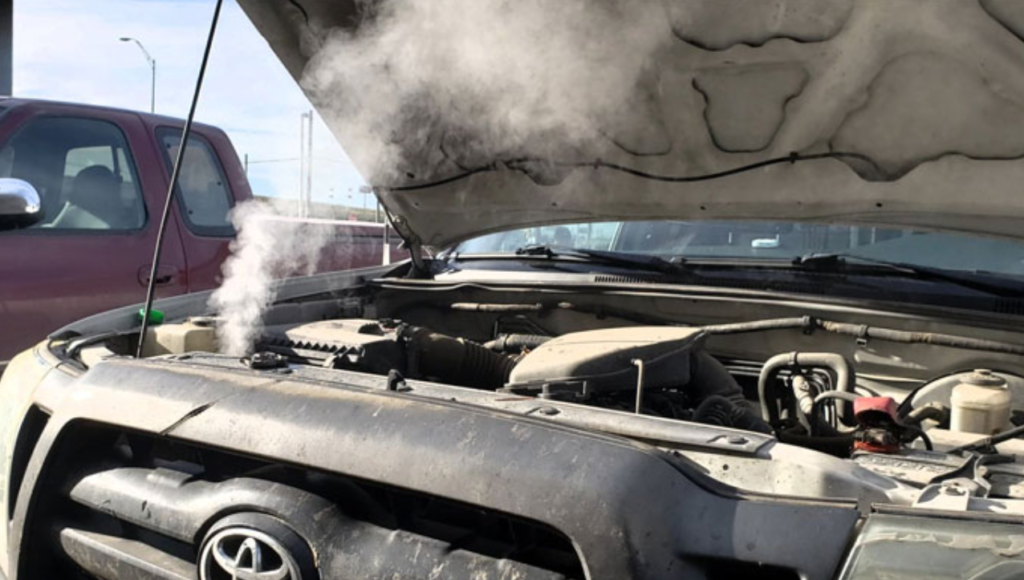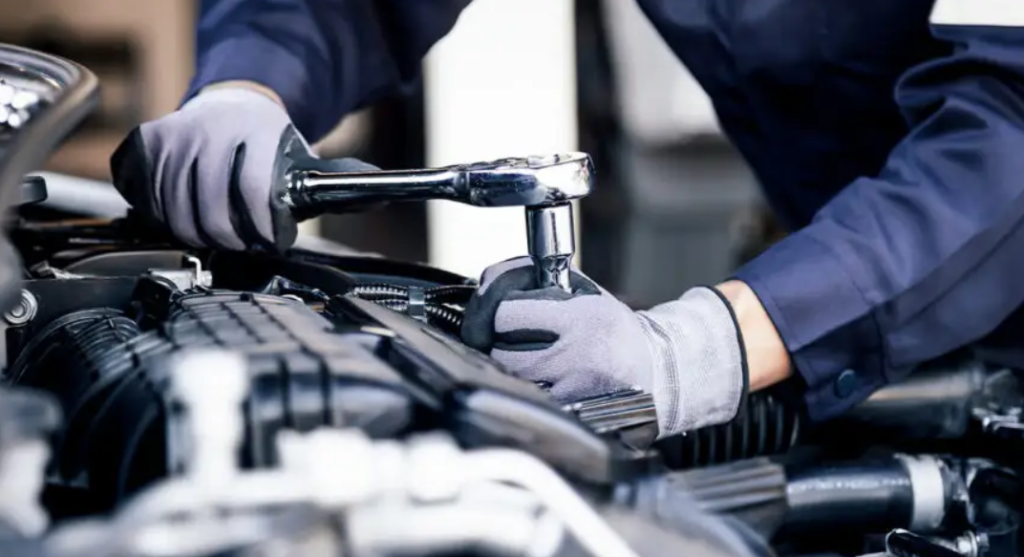There’s nothing quite as distressing as the roar of your car engine sounding louder when you accelerate. This sudden change in noise level may indicate a variety of issues, from simple, easily-fixable problems to more serious ones requiring professional help. It’s crucial to understand potential causes and solutions to when the car engine sounds loud when accelerating. After all, a noisy engine can disrupt your peaceful ride, and in some cases, it can be a sign of significant vehicle troubles.

Expanded Common Causes of Loud Engine Sounds When Accelerating
Several factors can cause your engine to sound loud when accelerating. We’ll delve deeper into each cause to provide a comprehensive understanding.
Exhaust System Issues: Engine Sounds Loud When Accelerating
The exhaust system plays a vital role in your vehicle’s functioning, responsible for safely carrying out exhaust gases from your engine. This system includes components like the exhaust manifold, oxygen sensors, catalytic converters, and mufflers, all working together to minimize the impact of exhaust gases on the environment and reduce noise produced by the escaping gases.
If there’s a hole, leak, or blockage in any part of your exhaust system, it can cause the engine to sound loud when accelerating. The noise usually becomes more pronounced when you step on the gas, resulting from the increased pressure and gas volume moving through the compromised exhaust system. Regular inspections and prompt repairs can help avoid exhaust system issues, ensuring a quieter and more eco-friendly ride.
Engine Misfiring
Engine misfires can lead to loud, irregular noises, especially noticeable when accelerating. Misfires occur when one or more of your engine’s cylinders fail to fire properly. This failure disrupts the smooth running of the engine, leading to an imbalance in the engine’s operation.
There are many reasons for misfires, including faulty spark plugs, damaged fuel injectors, or problems with the engine control unit (ECU). When you experience a misfire, your engine sounds loud when accelerating, and you may also notice reduced power and an increase in fuel consumption. Regular maintenance and timely replacement of spark plugs and fuel injectors can help prevent engine misfires.
Air Intake Problems
Air intake problems can make your engine roar louder, particularly when you accelerate. Your engine requires a precise mixture of air and fuel to run efficiently. An obstructed air intake or a dirty air filter can restrict the air supply to the engine.
This restriction forces your engine to work harder and louder, especially under acceleration. If the air filter becomes overly clogged, it can allow debris into the engine, resulting in severe damage over time. Regular air filter replacements and ensuring the air intake isn’t blocked can help prevent such issues.
Worn or Damaged Engine Components
Loud engine noise can also stem from worn or damaged engine components. Parts like the timing belt, pulleys, or even valves can cause a loud engine noise when they wear down or get damaged.
As you accelerate, the demand on these components increases, often making these noises more noticeable. Failure of these parts not only results in your engine sounding loud when accelerating but can also lead to serious engine damage. Regular inspections and timely replacements can help catch worn or damaged parts before they lead to larger, costlier problems.
Transmission Issues: Engine Sounds Loud When Accelerating
Your vehicle’s transmission is integral to its operation, transferring power from the engine to the wheels. Problems with the transmission can lead to loud engine noise, particularly during acceleration.
Transmission problems might stem from low transmission fluid levels, worn-out gears, or issues with the clutch (in manual vehicles). If you notice your engine sounds loud when accelerating in conjunction with shifting issues or a burning smell, it could indicate a transmission problem. Regular transmission check-ups and fluid changes can help keep these problems at bay.
Engine Overheating
Engine overheating is a serious issue and another cause for concern when your engine sounds loud when accelerating. Overheating can stem from several factors, including a malfunctioning thermostat, a leak in the cooling system, a clogged radiator, or a failing water pump.
A vehicle with an overheating engine tends to operate noisier, particularly during acceleration. The excessive heat can also lead to significant engine damage, including a blown head gasket or even a cracked engine block. Keeping your cooling system in optimal condition and addressing any overheating signs immediately can help prevent this problem.

Expanded Potential Risks and Dangers
Disregarding a loud engine when accelerating can lead to a variety of potential risks. Here’s an expanded look at the potential consequences of ignoring this issue.
Impact on Vehicle Performance
Excessive engine noise could signify that your vehicle is not performing at its optimum level. The power transferred from the engine to the wheels might not be sufficient, resulting in sluggish acceleration. Furthermore, the overall driving experience may feel rough or jerky, potentially leading to premature wear and tear on other vehicle components.
Increased Fuel Consumption
A loud engine often indicates that it’s working harder than necessary. This added strain usually means your engine is not running efficiently, translating into higher fuel consumption. Over time, this increased fuel usage can lead to significant additional costs, not to mention the negative impact on the environment.
Safety Implications
Safety is paramount when it comes to any vehicle operation. If your engine sounds loud when accelerating due to a severe mechanical issue, it could potentially compromise the vehicle’s safety on the road. For example, engine or transmission issues can lead to unexpected breakdowns, putting you and other road users at risk.
Potential for Further Engine Damage
Leaving engine noises unattended can lead to more extensive and costly damage over time. What might start as a minor issue—like a small exhaust leak or a slightly worn belt—can escalate into significant engine damage if not addressed promptly.
Expanded Troubleshooting and Resolving Loud Engine Sounds When Accelerating
Addressing a loud engine when accelerating involves a series of steps. Here’s how you can expand on the troubleshooting process.
Observing Other Symptoms
Observing other symptoms is a crucial first step in troubleshooting. Apart from a loud noise when accelerating, be aware of any additional symptoms such as vibrations, power loss, or warning lights on your dashboard. For instance, if your vehicle also vibrates when accelerating, it might indicate a problem with the drive shaft or suspension system. These signs can help narrow down the potential causes of the noise.
Identifying the Specific Noise
Different engine problems produce unique sounds. A hissing noise might indicate a vacuum leak, while a knocking sound could point to worn bearings. Accurately identifying the noise—whether it’s a hiss, hum, knock, or a roar—can significantly help in pinpointing the cause and devising an appropriate solution.
Performing a Visual Inspection
Before diving into more complicated diagnostics, start with a simple visual inspection. Check visible parts of your engine for any signs of wear, damage, or leaks. Inspect the condition of your belts and hoses, look for any signs of leaks, and check your exhaust system for any visible holes or rust.
Checking Fluid Levels: Engine Sounds Loud When Accelerating
One crucial aspect of troubleshooting involves checking your vehicle’s fluid levels. Make sure your oil and transmission fluid are not only at the appropriate levels but also in good condition. Low or dirty fluids can cause your engine to work harder and louder. An oil change might be all your vehicle needs to quiet down.
Conducting Diagnostic Tests
If the cause of the loud engine sound is not immediately clear after a visual inspection and fluid level check, consider conducting diagnostic tests. Many auto parts stores lend out diagnostic tools that can read your vehicle’s trouble codes and provide insight into what’s wrong. Alternatively, many professionals can perform a thorough engine diagnostic for you.
Seeking Professional Mechanic’s Assistance
If the problem persists after your troubleshooting efforts, it’s time to consult a professional mechanic. They have the knowledge and equipment to accurately identify the root of the problem and fix it appropriately. Ignoring or trying to fix a complex issue yourself can often lead to more damage and higher repair costs in the long run.

Expanded Preventive Maintenance and Care
To avoid problems like your engine sounds loud when accelerating, adhere to a regular maintenance schedule. Preventive measures can save you from many costly repairs down the line.
Regular Engine Maintenance
Regularly inspecting and servicing your engine is crucial. During regular maintenance, minor issues can be spotted and fixed before they escalate into significant problems.
Timely Oil Changes
Oil is the lifeblood of your engine, reducing friction between engine components and helping to keep the engine cool. Ensuring timely oil changes not only keeps your engine running smoothly but can also prevent loud engine sounds.
Air Filter Replacement
The air filter keeps dust and debris from entering your engine, ensuring it gets a clean air supply. Over time, the air filter can become clogged, leading to a reduced air supply. Regularly replacing your air filter can help your engine breathe better and run quieter.
Exhaust System Inspection: Engine Sounds Loud When Accelerating
The exhaust system plays a crucial role in your engine’s operation and noise levels. Regularly inspect your exhaust system for any leaks, holes, or obstructions to keep your engine running quietly and efficiently.
Transmission Servicing
The transmission is integral to your vehicle’s performance. Keeping your transmission in top shape with regular servicing and fluid changes can help prevent noise during acceleration and ensure smoother, more efficient vehicle operation.
Frequently Asked Questions (FAQs)
Why does my engine make a loud whining noise when I accelerate?
A loud whining noise when you accelerate could be due to various issues such as a worn-out power steering pump, a loose or worn serpentine belt, or a failing transmission. Whining noises are often associated with rotating components in your vehicle. It’s best to have the vehicle checked by a professional to diagnose and fix the issue.
Is it normal for engines to be loud when accelerating?
Engine sounds loud when accelerating due to the increased demand on the engine and its components. However, unusually loud noises or sudden changes in noise levels could indicate a problem. If your engine sounds excessively loud or different than usual, it might be best to have it checked out.
Can a dirty air filter cause loud engine noises when accelerating?
Yes, a dirty air filter can cause loud engine noises when accelerating. When the air filter is dirty or clogged, it restricts the amount of air that enters the engine, forcing the engine to work harder and, as a result, become louder. Regularly replacing your air filter can prevent this problem.
What should I do if my engine sounds loud and feels sluggish when accelerating?
If your engine is loud and feels sluggish when accelerating, it’s essential to address the issue promptly as it could indicate a severe problem such as a misfiring engine, transmission issues, or an exhaust system problem. It would be best to take your vehicle to a professional mechanic for a thorough inspection and diagnosis.
Can a faulty exhaust system cause loud engine noises during acceleration?
Absolutely. A faulty exhaust system, such as one with a hole or a leak, can indeed cause loud engine noises during acceleration. The exhaust system is designed to carry gases away from the engine quietly and efficiently. Any damage to this system can result in increased noise levels.
Why does my engine make a ticking or knocking noise when I press the gas pedal?
A ticking or knocking noise when you press the gas pedal could be a sign of several issues, including a low oil level, faulty lifters, or worn or damaged engine components. It’s important to address this issue promptly as it could lead to more severe engine damage.
Will driving with a loud engine noise damage my car further?
Yes, continuing to drive with a loud engine noise can potentially lead to more extensive and costly damage. The noise is usually a symptom of an underlying problem that, if not addressed, could worsen over time.
Can low engine oil level cause loud noises when accelerating?
Yes, a low engine oil level can cause your engine to make loud noises when accelerating. Engine oil serves to lubricate the engine’s components, reducing friction and noise. If the oil level is too low, it could result in increased friction, causing the engine to work harder and louder.
Is it safe to continue driving with a loud engine noise?
Generally, it’s not safe to continue driving with a loud engine noise. The noise could indicate a severe problem that could potentially lead to a breakdown or even a dangerous situation while driving. It’s recommended to have your vehicle checked as soon as possible to avoid any risks.
What are some signs of transmission problems that could cause loud engine sounds?
Signs of transmission problems that could cause loud engine sounds include difficulty shifting gears, slipping gears, a burning smell, a noisy neutral, or a lit-up transmission warning light. Any of these symptoms, along with loud engine noises, warrant an immediate visit to a mechanic.
Conclusion
In conclusion, while it can be disconcerting to hear your engine sounding loud when accelerating, understanding potential causes can help you tackle the problem effectively. Remember, neglecting such issues can lead to more severe consequences over time. Stay proactive in maintaining your vehicle’s engine, and never hesitate to seek professional help when necessary. Prevention, timely action, and a good understanding of your engine are the keys to a smooth, quiet ride.